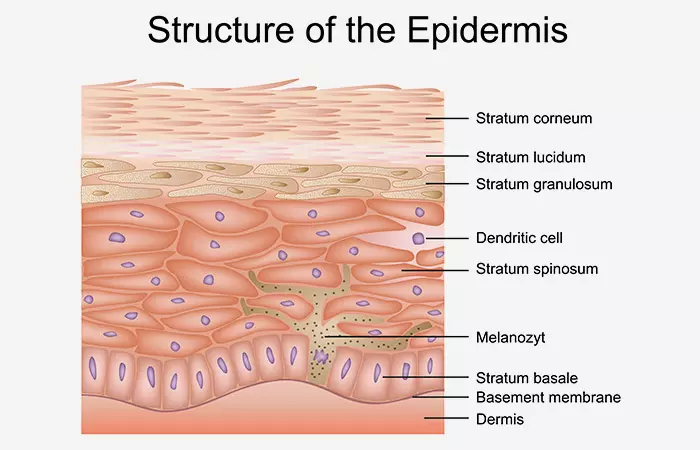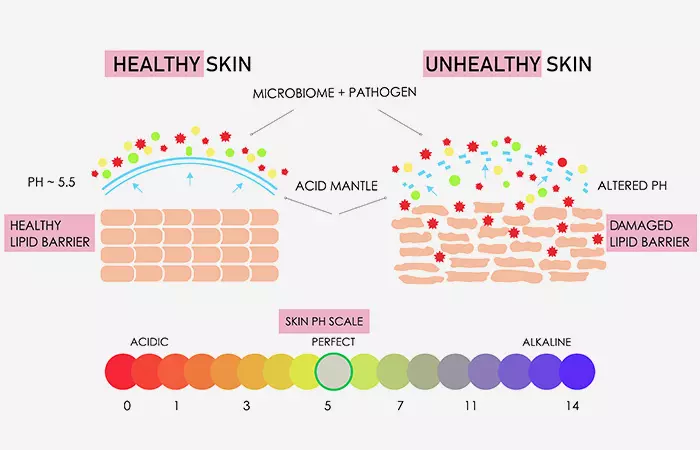What Is The Skin Barrier?
The stratum corneum (SC) is the outermost layer of the epidermis and is responsible for maintaining the skins barrier function. It is a highly organized, 3-dimensional structure made of lipids, fatty acids, ceramides, and protein layers stacked together to protect our skin. These lipid bilayers form a matrix called lipid lamellae (1). The stratum corneum locks in moisture to keep the skin plump, supple, and healthy. The skin barrier performs numerous critical functions for maintaining skin health. Read in the next section.
What Does The Skin Barrier Do?
The skin barrier prevents transepidermal water loss (TEWL) to maintain skin hydration (2). A damaged barrier makes your skin vulnerable to damage caused by biological and environmental factors like microbes, UV rays, free radicals, allergens, toxins(3). The skin barrier is responsible for:
Maintaining body temperature (4). Regulating the electrolyte balance by preventing loss of ions, water, and serum proteins (2). Maintaining a mechanism for sensation (4). Maintaining hydration and epidermal permeability (5). Preventing UV damage (5). Preventing infection (4).
Healthy skin’s pH levels are acidic and support the antimicrobial, antioxidant, and anti-inflammatory properties of the stratum corneum. This multifaceted protection provided by the skin barrier fights pathogens and prevents infections (5), (6). There is no doubt that the skin barrier plays an important role in protecting our skin. However, multiple factors can impair or damage it. Keep reading to find out more.
What Damages The Skin Barrier?
Any substance or environmental factor that irritates, dries, or changes the skin pH and lipid structure can damage its barrier (7). These include:
1. Excessive or frequent use of products with harsh chemicals like:
Detergents Cleansers Drying alcohols Alkaline ingredients Allergens
2. Extreme environmental factors like:
Prolonged UV exposure Harsh or dry winds Exposing skin to hot and cold water Low humidity
There are ways to identify if your skin barrier is compromised. Look for the following signs and symptoms.
How To Tell If Your Skin Barrier Is Damaged
Dry And Flaky Skin: An impaired skin barrier cannot lock moisture in the cells. This affects the skin ceramide levels. Ceramides are crucial for maintaining skin barrier functions, such as water permeability (8). As a result, your skin turns dry and flaky. However, dryness is not an exclusive sign of a damaged skin barrier.
Red, Inflamed, And Itchy Skin: Skin irritation is a primary symptom of a damaged skin barrier. You may notice redness, inflammation, itchiness, and sensitivity.
Burning Sensation: Skin irritation or a burning sensation when skin care products are applied is common when the skin barrier is compromised.
Skin Conditions: Damaged skin barrier is one of the main reasons for skin issues like rosacea, eczema, psoriasis, acne, contact dermatitis, and ichthyosis.
Premature Signs Of Aging: Premature signs of aging like fine lines, wrinkles, sagging skin are attributed to the weak skin barrier.
If you have a compromised skin barrier, there are ways to repair it. Keep reading to find out.
How To Repair Skin Barrier
1. Keep It Hydrated
Ensure that your skin is well hydrated and moisturized. Heres what you can do:
Use moisturizers and emollients (9). Use products with hyaluronic acid, ceramides, and peptides for additional nourishment. Add nourishing serums and oils to the skin care routine. Drink plenty of water to stay hydrated from within.
A study conducted on 3978 American adults found that 60% of men did not moisturize at all, while 39% moisturized their face at all. Out of this, 16% of men moisturized their face daily, while 23% moisturized less frequently.
2. Protect Your Skin
Protect your skin from the harsh sun and extreme weather conditions by following these methods:
Use sunscreen with at least SPF 30. Avoid prolonged sun exposure. Use an umbrella or scarf to protect your skin. Avoid taking long and hot showers. Use lukewarm water.
3. Avoid Harsh Chemicals
Harsh chemicals can damage your skin barrier and alter the skin pH. Follow these tips:
Avoid using products with alkaline and drying agents, such as alcohols and sulfates. Do not wash your face often, as it can strip natural oils and moisture. Avoid abrasive physical scrubs and avoid frequent exfoliation.
4. Include Antioxidants In Your Diet And Skin Care Routine
Antioxidants are free radical scavengers and help prevent oxidative stress and premature aging to maintain a healthy skin barrier (10), (11). You may consume antioxidant-rich foods like berries, green leafy vegetables, and fruits. You may also use products containing antioxidants like alpha-tocopherol, vitamins C and E, and retinol (vitamin A-derivative). Oral supplemention of antioxidants and collagen may also be considered to help prevent oxidative stress and boost collagen synthesis respectively. You can also incorporate barrier repairing ingredients into your daily skin care routine. Check out the best ingredients to keep your skin barrier healthy.
The Best Hydrators For Your Skin Barrier
Knowing how to hydrate your skin is key to repairing a damaged skin barrier and preventing issues like dryness and irritation. Hydration improves skin barrier resilience. When buying skin care products, look for the following ingredients to support a healthy skin barrier (4):
Ceramides Hyaluronic acid Licorice extracts Dimethicone Petrolatum (avoid this if you have acne-prone skin) Paraffin wax treatment
Does Aquaphor repair the skin barrier? Aquaphor contains the necessary moisture to rebuild your skin’s barrier. It’s a glycerin- and petroleum-based ointment that protects, moisturizes, and heals the skin. Can you permanently damage your skin barrier? Skin barrier damage can usually be repaired. Even if your skin barrier has recently been disturbed (perhaps due to over-exfoliation with abrasive chemicals), repairing it should be simple if you seek care immediately Can niacinamide repair the skin barrier? Yes. Niacinamide enhances skin texture and repairs and improves the skin’s protective barrier function. This eventually minimizes inflammation that could manifest as dry, itchy, or flaky skin (1).
Find ways to repair your damaged skin barrier. Watch this insightful video and get to know how to identify a damaged skin barrier and get skin care tips to restore and strengthen your skin’s natural protective barrier.







